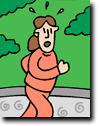August 24, 2004 [Volume 5, Issue 18]
To Your Health is brought to you by:
Aerobics for Your Bones
 For
women in their 50s, the postmenopausal stage can be the most crucial time
in their lives, particularly with respect to declining hormone levels
and bone density. Evidence suggests that women lose approximately 2.5
percent of their bone mineral density (BMD) per year following menopause.
But a recent analysis of 13 studies showed that aerobic exercise can help
maintain BMD as women age.
For
women in their 50s, the postmenopausal stage can be the most crucial time
in their lives, particularly with respect to declining hormone levels
and bone density. Evidence suggests that women lose approximately 2.5
percent of their bone mineral density (BMD) per year following menopause.
But a recent analysis of 13 studies showed that aerobic exercise can help
maintain BMD as women age.
Of the exercises evaluated, the most positive data with respect to bone density was associated with jogging, brisk walking and stair climbing, in that order. Results indicated that BMD was most improved in the lumbar vertebrae and femoral neck.
For years, prescription drugs has been the first line of defense in preventing bone loss and osteoporosis; however, this analysis adds to increasing evidence suggesting the value of more conservative tactics, namely exercise. For more information on ways to maintain bone density and ward off osteoporosis, talk to your doctor of chiropractic; to learn more about women's health, visit www.chiroweb.com/find/archives/women.
Reference: Miller LE, Nickols-Richardson SM, Ramp WK, et al. Bone density in postmenopausal women. Does exercise training make a difference? The Physician and Sportsmedicine February 2004;32(2).
Nutritional Tips on Avoiding Hay Fever
If you're sneezing day after day, even when you don't have a cold, hay fever may be the cause. But don't worry; there may be a solution: Recent research suggests that certain fatty acids and antioxidants are more likely to contribute to hay fever than previously thought.
Dr. Gabriele Nagel and colleagues gathered data from 334 adults with hay fever, and 1,336 adults without hay fever, noting the amount of fatty acids and antioxidants consumed by members of each subject group. Those consuming large amounts of eicosapentaenoic acid (EPA, an omega-3 type fatty acid) were less likely to suffer from hay fever. On the other hand, those consuming oleic acid (the most common fatty acid, typically in olive oil) nearly tripled subjects' chances of having hay fever. Similarly, protective results were seen in diets rich in vitamin E, although high beta-carotene (vitamin A) intake appeared to increase the risk for hay fever.
While these study results don't warrant avoiding certain foods definitively, it's probably a good idea to pay attention to what you consume. And dropping that smoking habit -- if you have one -- couldn't hurt, either: Smoking is a proven risk factor for hay fever and other allergic conditions.
For more information on general health, visit www.chiroweb.com/find/archives/general/.
Reference: Nagel G, Nieters A, Becker N, Linseisen J. The influence of the dietary intake of fatty acids and antioxidants on hay fever in adults. Allergy December 2003;58(12):1277-1284.
Smart From the Start
These days, it's difficult to tell if people pursue higher education to secure their future or simply to develop intellectually. Regardless, it is becoming increasingly clear that developing early cognitive abilities helps secure one thing: future cognitive abilities.
 A
birth cohort study was conducted in the 1960s, consisting of 5,362 people
born in England, Scotland and Wales during one week in 1946. The 15-year-old
subjects were given a test to measure memory, concentration and speed.
In 1999, 2,058 53-year-old subjects met the criteria for further testing
but the subjects, while older, were not necessarily wiser.
Numerous subjects who indicated a decline in memory were consistent with
those who, in childhood, achieved lower test scores.
A
birth cohort study was conducted in the 1960s, consisting of 5,362 people
born in England, Scotland and Wales during one week in 1946. The 15-year-old
subjects were given a test to measure memory, concentration and speed.
In 1999, 2,058 53-year-old subjects met the criteria for further testing
but the subjects, while older, were not necessarily wiser.
Numerous subjects who indicated a decline in memory were consistent with
those who, in childhood, achieved lower test scores.
Though it is still unclear if test results in adulthood affect memory later in life, this study underscores the need to foster intellectual growth in children before it's too late. Although some of the subjects that scored low as children were able to attain higher scores as adults, they still experienced a decline in memory with age compared to those who were "smart from the start."
To learn more about ways to maximize your children's health and wellness, visit www.chiroweb.com/find/archives/pediatrics.
Reference: Richards M, Shipley B, Fuhrer R, Wadsworth MEJ. Cognitive ability in childhood and cognitive decline in mid-life: longitudinal birth cohort study. BMJ Mar. 6, 2004;328(7439),pp 552.
This issue features a number of articles you will want to share with your family, friends and co-workers. Please feel free to forward this newsletter to them via e-mail. If you have received this e-mail newsletter from someone else, you may subscribe free of charge and begin receiving your own copy by going to: www.chiroweb.com/newsletter/TYH/subscribe.php
Visit Dynamic Chiropractic's "Ask a Doctor of Chiropractic" forum at www.chiroweb.com/find/ask.html, where 15 doctors of chiropractic are waiting to answer any of your health questions.
Thank you for subscribing to To Your Health. If you have received this newsletter in error or wish to unsubscribe, you may remove your name from our e-mail subscription list at www.chiroweb.com/newsletter/TYH/unsubscribe.php.
If you have any questions regarding your subscription, please complete this form at www.chiroweb.com/newsletterhelp/TYH.
This edition of To Your Health newsletter is co-sponsored
by:
